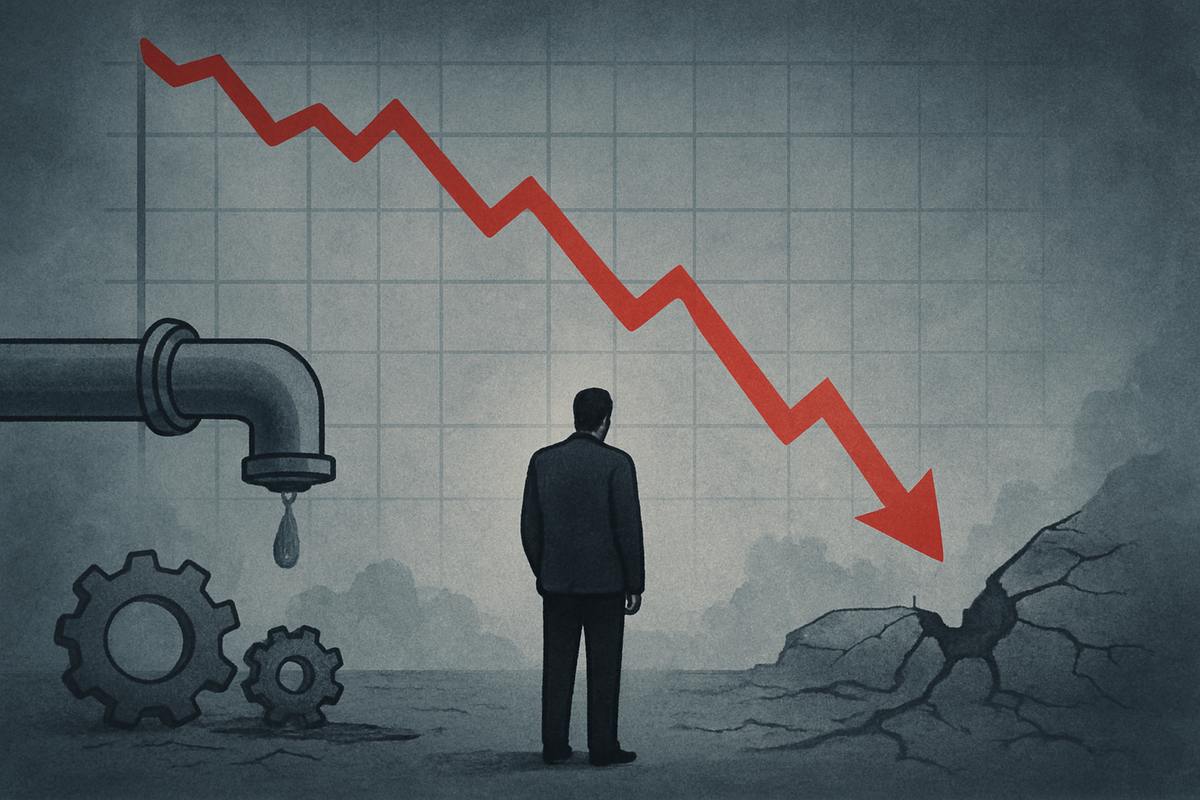Aimei Health Technology (AFJK) Plunges Over 42% Amidst Liquidity Crisis and Going Concern Doubts

New York, NY – November 10, 2025 – Aimei Health Technology (NASDAQ: AFJK) experienced a dramatic collapse in its stock price today, plummeting over 42% as severe liquidity challenges, pervasive governance risks, and explicit doubts about its ability to continue as a going concern sent shockwaves through the market. The precipitous decline underscores a precarious financial situation for the blank check company, raising immediate red flags for investors grappling with heightened volatility and the looming threat of significant capital loss.
The immediate implications for shareholders are stark: extreme volatility, a high probability of further capital erosion, and the very real possibility of liquidation should the company fail to complete its long-delayed business combination. With an already diminished trust account and minimal operating cash, Aimei Health Technology's future hangs precariously in the balance, demanding urgent attention from both current and prospective investors.
Unpacking the Crisis: A Detailed Look at AFJK's Woes
The dramatic downturn in Aimei Health Technology's (NASDAQ: AFJK) stock is a direct consequence of a confluence of critical financial and operational weaknesses. At the heart of the crisis are severe liquidity challenges, highlighted by a staggering 40% reduction in its trust account. What once held $73.8 million has dwindled to $44.5 million due to extensive shareholder redemptions. Compounding this, the company is left with a mere $2,138 in operating cash and a substantial working capital deficit of $2.17 million. InvestingPro data further paints a grim picture with a current ratio of 0.02, signaling that its short-term obligations vastly outstrip its liquid assets. The company's reliance on an unsecured promissory note of $150,000 from its sponsor and United Hydrogen Group Inc. to merely fund an extension of its business combination deadline underscores the severity of its cash constraints.
Adding to the financial instability are significant governance risks. Aimei Health Technology has openly disclosed a "material weakness in its internal controls over financial reporting." This critical flaw is attributed to inadequate segregation of duties and a lack of formalized written policies and procedures, which erodes investor confidence in the company's financial oversight and operational integrity. Such disclosures often signal deeper systemic issues that can deter potential investors and complicate any future strategic maneuvers.
Perhaps the most alarming revelation is management's explicit admission of "substantial doubt about the ability to continue as a going concern." As a Special Purpose Acquisition Company (SPAC), AFJK's sole purpose is to complete a business combination. The company has repeatedly extended its deadline, with the latest being the twelfth extension to December 6, 2025, to finalize its merger with United Hydrogen Group Inc. (UHG). The extensive shareholder redemptions preceding this decline are a clear indicator of a widespread lack of confidence in the company's ability to successfully close this merger. Without a successful combination, the company faces likely liquidation, leaving remaining shareholders to recoup only a pro-rata share from the already depleted trust account. Aimei Health Technology currently has no significant operations or revenue generation, making the successful completion of the UHG merger absolutely critical for its survival.
The market's initial reaction has been swift and unforgiving. The over 42% single-day decline, despite previous intraday rallies, highlights the extreme volatility and speculative nature surrounding AFJK. Analysts have largely adopted a pessimistic outlook, with a consensus "Sell" rating, further advising caution. Key stakeholders involved primarily include the company's management, its sponsor, United Hydrogen Group Inc. as the target acquisition, and, crucially, its remaining shareholders who face the brunt of these financial uncertainties. The repeated extensions and the ongoing cash crunch suggest a prolonged struggle to achieve its primary objective, leading to growing investor apprehension and a significant reevaluation of its prospects.
Market Ripple Effects: Who Wins and Who Loses?
The dramatic decline of Aimei Health Technology (NASDAQ: AFJK) sends ripples across the broader market, particularly impacting the already scrutinized SPAC sector and companies within the nascent hydrogen energy industry. The most immediate losers are undoubtedly AFJK's existing shareholders, who have seen the value of their investments severely diminish, facing the prospect of further losses or even liquidation. The company's sponsor, along with United Hydrogen Group Inc. (UHG), also stands to lose significantly. UHG's aspirations for a public listing via this SPAC merger are now in serious jeopardy, potentially forcing them to seek alternative, and likely less favorable, routes to market or capital. The protracted delays and financial instability of AFJK could tarnish UHG's reputation and make future fundraising efforts more challenging.
For other SPACs, especially those struggling to find suitable targets or facing their own redemption pressures, AFJK's situation serves as a stark warning. It could exacerbate investor skepticism towards the SPAC model as a whole, leading to increased redemptions in other blank check companies and making it harder for new SPACs to raise capital. This event might prompt a more rigorous due diligence process from investors and regulators alike, potentially cooling the SPAC market further. Companies within the health technology sector that are well-governed and financially stable might see a slight benefit from this flight to quality, as investors shy away from speculative plays and gravitate towards more robust enterprises.
In the hydrogen energy sector, UHG's potential failure to go public through AFJK could temporarily dampen enthusiasm for smaller, emerging players. However, larger, more established companies in the hydrogen space, particularly those with strong financial backing and clear paths to commercialization, might indirectly benefit. This event could consolidate investor interest around proven entities, rather than speculative ventures. For instance, established players like Plug Power (NASDAQ: PLUG) or Bloom Energy (NYSE: BE), which have already demonstrated operational capabilities, might be viewed as safer bets. Conversely, smaller, privately held hydrogen companies seeking to go public might face increased scrutiny and difficulty in securing SPAC partners or traditional IPOs, as the market becomes more cautious about the viability and governance of pre-revenue entities attempting to access public capital.
Broader Significance: A Bellwether for SPACs and Emerging Tech
The unfolding crisis at Aimei Health Technology (NASDAQ: AFJK) transcends the individual company, serving as a critical bellwether for broader industry trends, particularly within the Special Purpose Acquisition Company (SPAC) landscape and the often-speculative realm of emerging technologies. This event underscores the inherent risks associated with SPACs, especially those that struggle to identify and close viable business combinations within their mandated timelines. It highlights how prolonged periods without operational revenue, coupled with significant shareholder redemptions, can rapidly deplete trust accounts and push companies to the brink of insolvency. The governance issues, specifically the "material weakness in internal controls," could prompt increased regulatory scrutiny from bodies like the SEC, potentially leading to stricter guidelines for financial reporting and internal oversight within SPACs.
The ripple effects are likely to extend to other SPACs, particularly those nearing their business combination deadlines or experiencing high redemption rates. Investors may become more discerning, demanding greater transparency, stronger governance, and more compelling target companies before committing capital. This could lead to a further cooling of the SPAC market, forcing some blank check companies to liquidate if they cannot secure mergers or extend their deadlines. For partners and service providers to SPACs, such as underwriters, legal firms, and advisory services, a slowdown in SPAC activity could impact their revenue streams. Historically, periods of intense speculation in new financial instruments or sectors often end with high-profile failures, and AFJK's situation draws parallels to the dot-com bubble burst or the subprime mortgage crisis, where lax standards and over-optimism led to significant losses.
Furthermore, this event casts a shadow over the "health technology" and "hydrogen energy" sectors, specifically concerning the viability of early-stage or pre-revenue companies seeking public market access. While both sectors hold immense long-term potential, AFJK's struggles remind investors that promising technologies require robust financial foundations and sound management to succeed. It reinforces the importance of fundamental analysis over speculative fervor, pushing investors to prioritize companies with clear business models, demonstrated revenue, and strong governance. Regulatory bodies might also increase their focus on the disclosures and financial health of companies entering the public market through non-traditional routes like SPACs, ensuring that investors are adequately informed of the risks involved. The AFJK situation could be a catalyst for a more mature and cautious approach to investing in early-stage public companies, demanding higher standards of operational readiness and financial stability.
What Comes Next: A Critical Juncture for Aimei Health Technology
The immediate future for Aimei Health Technology (NASDAQ: AFJK) is highly precarious, with several critical junctures approaching that will determine its ultimate fate. In the short term, the company faces an urgent need to address its severe liquidity challenges and, most critically, to successfully finalize its merger with United Hydrogen Group Inc. (UHG) by the extended deadline of December 6, 2025. Failure to complete this business combination will almost certainly lead to the company's liquidation, where remaining shareholders would receive only their pro-rata share of the already diminished trust account. The company's ability to secure additional funding, either through its sponsor or other means, to sustain operations until the merger is complete, will be paramount.
Looking further ahead, if the merger with UHG does somehow materialize, AFJK would then pivot from being a blank check company to an operating entity focused on hydrogen technology. This would present a new set of challenges, including integrating UHG's operations, establishing revenue streams, and demonstrating a viable path to profitability in a competitive and capital-intensive industry. The "material weakness in internal controls" would need to be rectified swiftly to rebuild investor confidence and ensure compliance with public company standards. Potential strategic adaptations might include seeking new partnerships, divesting non-core assets, or even exploring a take-private transaction if public market conditions remain unfavorable.
Market opportunities or challenges emerging from this situation are significant. For investors, the extreme volatility presents a high-risk, high-reward scenario for those willing to speculate on a last-minute turnaround, though the odds appear stacked against it. Conversely, for opportunistic private equity firms or distressed asset investors, the situation could present an opportunity to acquire UHG or parts of AFJK at a significantly discounted valuation should the public merger fail. Scenarios range from a successful, albeit challenging, merger completion and subsequent operational pivot, to the more likely outcome of liquidation. The most optimistic scenario involves a rapid and successful resolution of liquidity issues, a robust integration with UHG, and a clear strategy for growth, which currently seems a distant prospect given the current financial and governance hurdles.
Comprehensive Wrap-Up: A Cautionary Tale for Investors
The dramatic decline of Aimei Health Technology (NASDAQ: AFJK) serves as a potent cautionary tale for investors navigating the complexities of the financial markets, particularly within the speculative realms of SPACs and emerging technology ventures. The key takeaways from this event are clear: severe liquidity challenges, significant governance risks, and explicit doubts about a company's ability to continue as a going concern are immediate and powerful indicators of impending financial distress. AFJK's journey highlights the critical importance of robust financial health, transparent governance, and a clear, executable business plan, especially for companies that are pre-revenue or operating on tight deadlines.
Moving forward, the market will undoubtedly assess the long-term implications of this event on the broader SPAC ecosystem. It reinforces the need for rigorous due diligence from investors, emphasizing the scrutiny of trust account balances, redemption rates, and the viability of proposed business combinations. The potential for regulatory bodies to tighten oversight on SPAC structures and disclosures also looms large, aiming to protect retail investors from similar pitfalls. The lasting impact of AFJK's struggles could be a more cautious, discerning approach to SPAC investments, potentially leading to a healthier, albeit smaller, market for blank check companies in the future.
For investors, the coming months will require vigilant monitoring of Aimei Health Technology's progress towards its December 6, 2025 merger deadline with United Hydrogen Group Inc. (UHG). Any announcements regarding financing, merger developments, or further governance improvements will be critical. However, given the current financial precariousness and the "going concern" warning, extreme caution is advised. The situation underscores the timeless investment principle that fundamentals—liquidity, governance, and operational viability—ultimately dictate a company's fate, far outweighing speculative hype.
This content is intended for informational purposes only and is not financial advice



